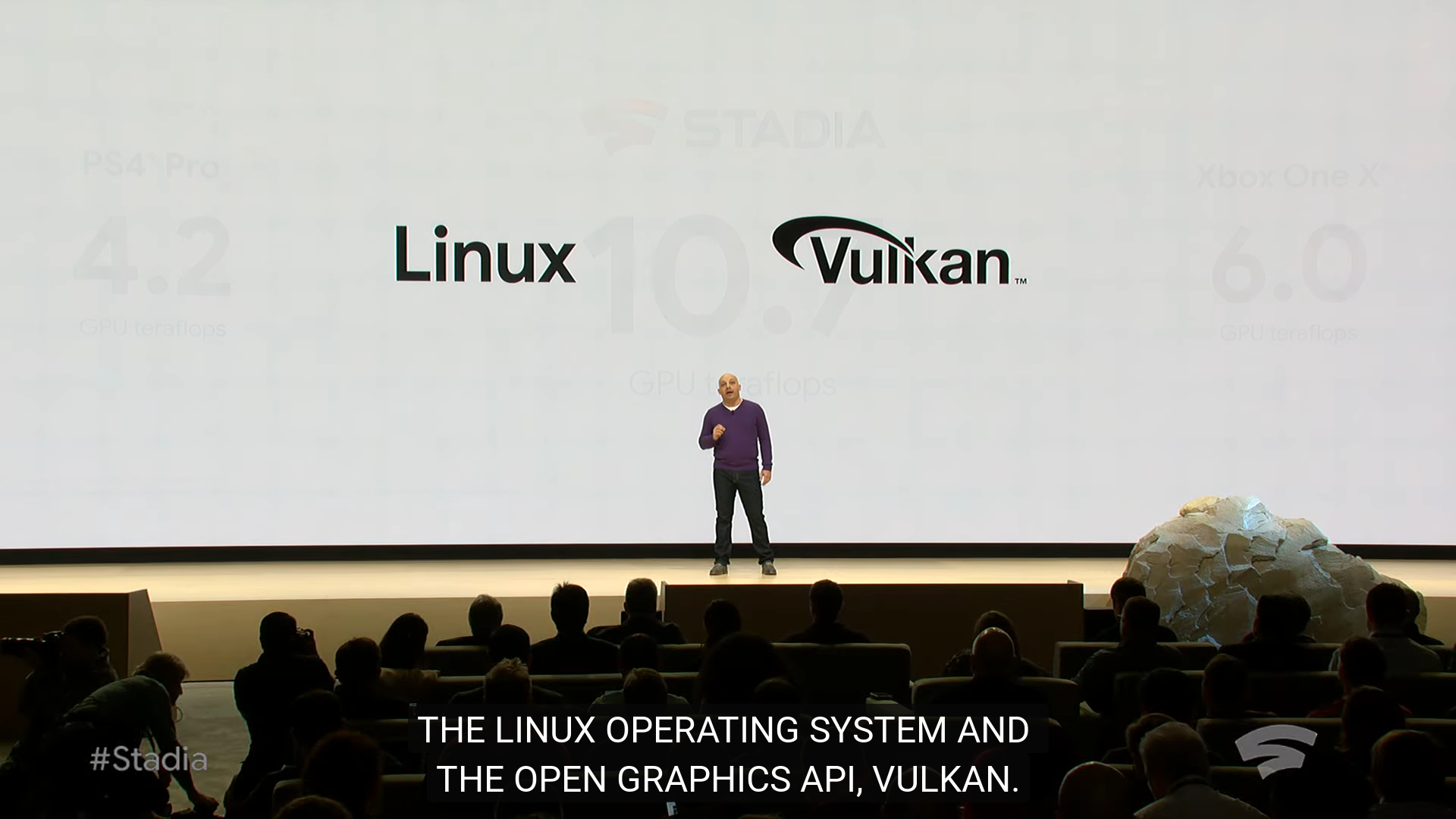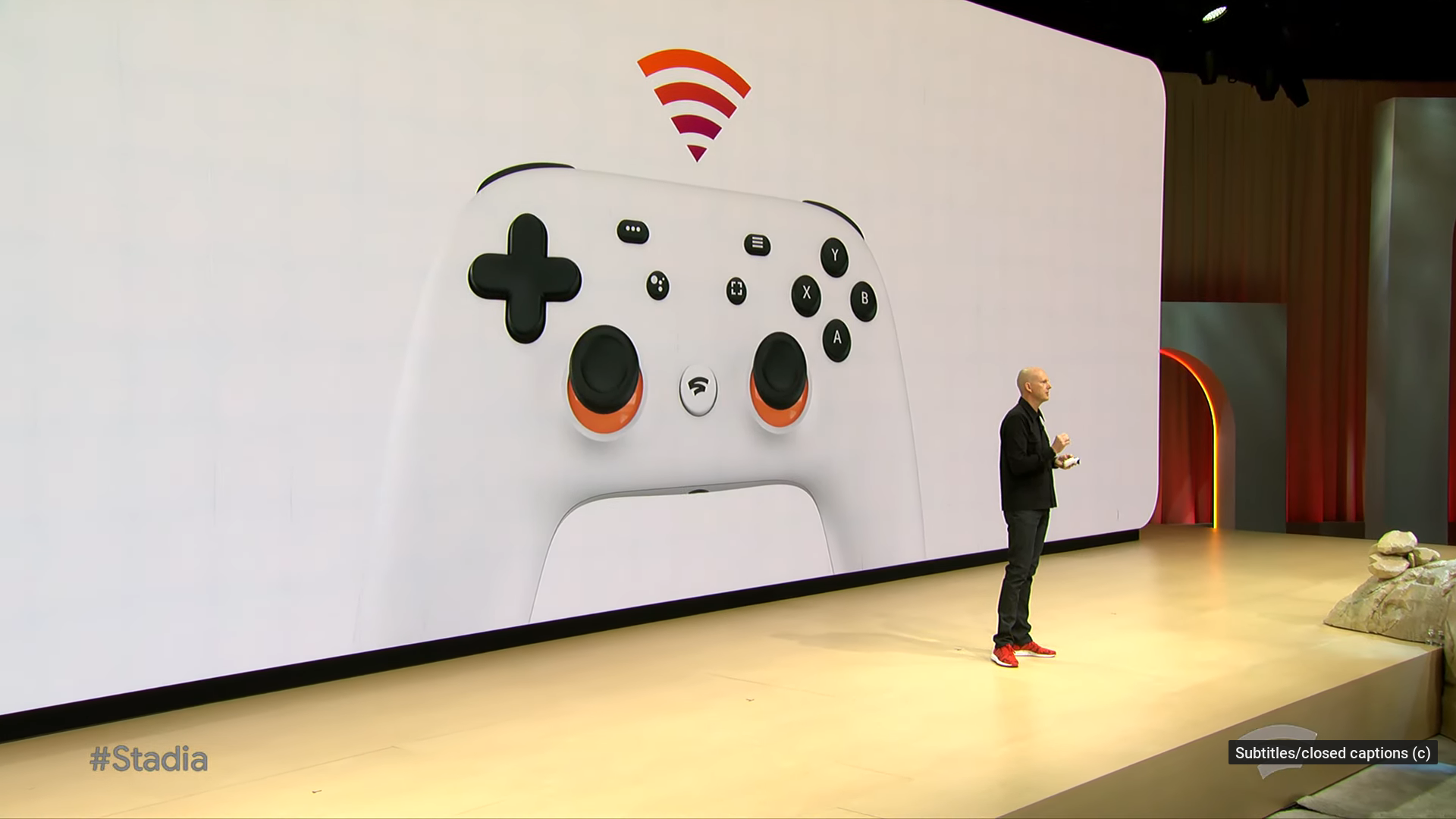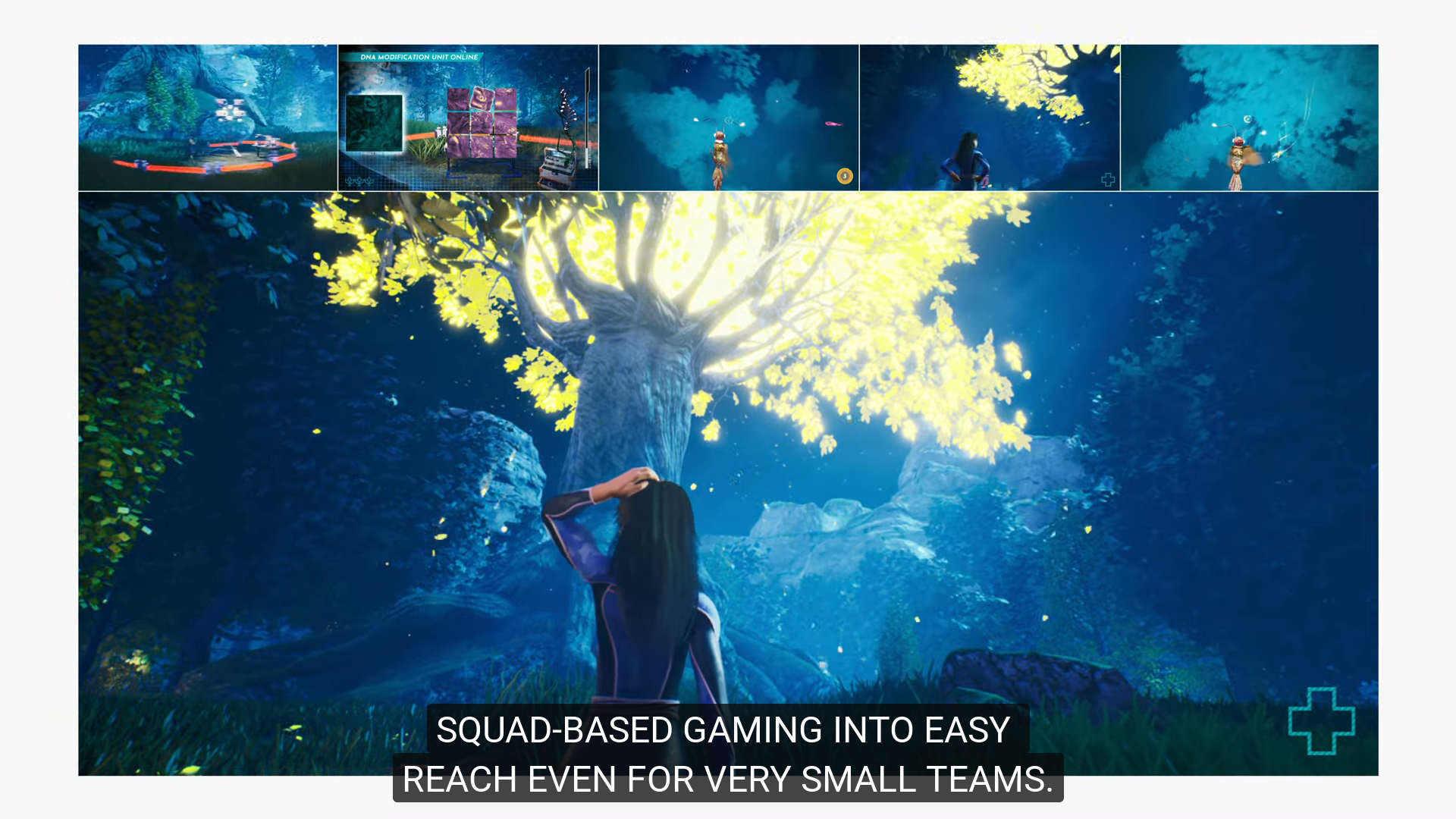Google have now finally unveiled their new cloud gaming service named Stadia, offering instant access to play games in Google Chrome.
What they joked was the worst-kept secret in the industry (no kidding), sounds like quite an interesting service. Certainly one that could eventually end up redefining what gaming is. A little hyperbolic maybe? I'm not so sure considering how easy this should be to jump into a game. On top of that, they very clearly talked about how it's built on Linux (Debian specifically) and Vulkan with custom GPUs from AMD.
Something they showed off, was how you could be watching a game trailer with a button to play it on Stadia and (supposedly within a few seconds) you would jump right into it. That's quite en exciting idea, one that would easily pull in quite a lot of people I've no doubt.
As for resolution, they said it will support 1080p and 4K around 60FPS at release with 8K being worked on as well but that sounds further out if anyone even cares about 8K right now.
They also showed off their new controller, with a dedicated Google Assistant button and a button to capture video immediately for YouTube:
While Google are making their own dedicated gamepad, they did say it will be compatible with other devices too.
They also announced partnerships with both Unity and Unreal Engine and Stadia will "embrace full cross-platform play" including "game saves and progression". They also had id Software, talk about how it didn't take long to bring the new Doom Eternal to Stadia, thanks to how they made the previous Doom game with Vulkan.
This means, that development for Linux is suddenly going to become a priority for a lot more developers and publishers. I don't want to overstate how important that is, but it's a very exciting prospect. This doesn't suddenly mean we're going to see a lot more Linux games on the desktop, but it's entirely possible after they go through all the work to get the games working on Linux with Vulkan for Stadia.
Stream Connect is another service they talked about. They mentioned how developers have pushed the boundaries of gaming but often local co-op is left out, as doing it multiple times in top-end games can require really beefy hardware. With Stadia, each instance would be powered by their servers so it wouldn't be such an issue. They also talked about how if you're playing some sort of squad-based game, how you could bring up their screen to see what they're doing which sounds very cool.
Google also announced the formation of their own game studio, Stadia Games and Entertainment, to work on exclusive games for their new service.
As for support from more external game developers, they mentioned how they've shipped "development hardware" to over 100 developers. From what they said, it should be open to smaller developers as well as the usual AAA bunch.
Stadia is confirmed to be launching this year and it will be first available in the US, Canada, UK and "most of Europe". One thing wasn't mentioned at all—price, but they said more details will be available in the summer. The official site is also now up on stadia.com and developers have their own website to look over.
Google also posted up some extra information on their developer blog:
Google believes that open source is good for everyone. It enables and encourages collaboration and the development of technology, solving real-world problems. This is especially true on Stadia, as we believe the game development community has a strong history of collaboration, innovation and shared gains as techniques and technology continually improve. We’re investing in open-source technology to create the best platform for developers, in partnership with the people that use it. This starts with our platform foundations of Linux and Vulkan and shows in our selection of GPUs that have open-source drivers and tools. We’re integrating LLVM and DirectX Shader Compiler to ensure you get great features and performance from our compilers and debuggers. State-of-the-art graphics tools are critical to game developers, and we’re excited to leverage and contribute to RenderDoc, GAPID and Radeon GPU Profiler — best of breed open-source graphics debugging and profiling tools that are continually improving.
There's probably plenty I missed, you can see their video on YouTube here.
As exciting and flashy as it sounds, it's obviously not Linux "desktop" gaming which is what the majority of our audience is likely interested in. However, things change and if it does become a huge hit we will cover it more often if readers request it. Linux gaming can mean all sorts of things from native games to emulators, Wine and Steam Play and now perhaps some cloud gaming so I don't want to rule it out. However, I can't see this replacing Steam, Humble, GOG, itch.io and so on for me personally.
Obviously there’s still a lot of drawbacks to such a service, especially since you will likely have zero ownership of the actual games so they could get taken away at any time when licensing vanishes. At least with stores like Steam, you still get to access those games because you purchased them. Although, this does depend on what kind of licensing Google do with developers and publishers, it might not be an issue at all but it’s still a concern of mine. Latency and input lag, are also two other major concerns but given Google's power with their vast networks, it might not be so bad.
Also, good luck monitoring your bandwidth use with this, it's likely going to eat up a lot all of it. YouTube and Netflix use up quite a bit just for watching a 30-minute episode of something in good quality, how about a few hours per day gaming across Stadia? Ouch.
That doesn't even address the real elephant in the room, you're going to be giving Google even more of your data if you use this service, a lot more. This is the company that failed to promptly disclose a pretty huge data leak in Google+ after all. I don't want to be some sort of scaremongering crazy-person but it's something to think about.
As always, the comments are open for you to voice your opinion on it. Please remain respectful to those with a different opinion on the matter.
... and surely not going to use even more DRMed Stadia for same reason.
As I wrote above, Stadia is by its very design DRM free.
Yes, of course it is! DRM is used to limit what you can do with goods you "have", but don't own. You never even get to "have" a game you are allowed (by the owner) to stream for a time. DRM is useless in such a situation, because you cannot capture the game by streaming it. You also cannot lose what you never had. I think it's even more honest than the restricted use of a DRMed software, that you only seem to own.
If you don't like the idea playing games you don't have, then simply don't do it!
If game streaming prevents you from making copies of the game, it is DRM. You could use game streaming to restrict your users from having copies, both legal and illegal, of your game, so DRM. And that is bad because there are obvious use cases that are completely legitimate and require having a local copy - for example, "I don't have unlimited bandwidth all the time" or "preservation of games". You are allowed to play that game, but the system is (to borrow EFFs slogan) defective by design.
Renting DRM-free digital media is a silly idea because of how digital files works (copying is so intrinsic that you can't transfer it without making a copy). There is nothing to be returned after the rental, nothing stopping the person from keeping a copy forever. It makes no sense... unless you start to use DRM. Which is terrible and shouldn't be done. So, don't "rent" digital goods. If you want a subscription-based service, rely on something else - on continued access to your hardware, on getting new content - but not on the person having to pay again and again for the same thing.
Renting DRM-free digital media is a silly idea because of how digital files works (copying is so intrinsic that you can't transfer it without making a copy). There is nothing to be returned after the rental, nothing stopping the person from keeping a copy forever. It makes no sense... unless you start to use DRM. Which is terrible and shouldn't be done. So, don't "rent" digital goods.
That's what my initial thought was as well, renting of digital goods is just pointless. But the reason for it can be economical. I.e. renting something is expected to be cheaper than buying. So in theory, renting digital goods can be an OK approach, when it charges less. However as you said, it quickly turns sour if renting starts enforcing limited usage through DRM (which it practically always does, in cases like Netflix, Spotify, and Stadia here as well). I.e. as long as you don't have unrestricted access to downloaded digital files (after you already authenticated and paid something naturally) it's DRMed.
Ugh, gaming "as a service". Frankly, this is worse than games not supporting Linux. Games might be developed for Linux (servers)... but then we can't buy the games to run in our Linux systems. This is the antithesis of FOSS - we don't even have the freedom to run the software ourselves. It's like the most intrusive always online DRM ever coupled with the least software freedom technology allows.
On the other hand, it's a way to check games which could otherwise end up on the Steam pile of shame.
Where does games with subscription services like WoW or EQ stands, in your logic? Might help me figure it out.
But Stadia doesn't rent you games. It sells a monthly access to their game library.
Which essentially means it rents you all of their games, for a month. So, renting :)
But Stadia doesn't rent you games. It sells a monthly access to their game library.
Which essentially means it rents you all of their games, for a month. So, renting :)
And I'm pretty fine with the concept.
Edit: If I don't like the game lineup, I just cancel my subscription. And if there is only a game that I like, I subscribe for a month, play the game and be done with it. If I want to replay it again, I get it at Steam after that. :)
Last edited by Mohandevir on 20 Mar 2019 at 6:06 pm UTC
And I'm pretty fine with the concept.
I'm not saying the concept itself is useless. It's a problem when it's the only way the store offers access and there is no alternative to buy something in that store (DRM-free), which essentially makes this store totally DRMed.
If I want to replay it again, I get it at Steam after that. :)
And that's the catch. You'd need to find such game in another store, and nothing guarantees it will be there. Didn't Google want to make their own studio just for Stadia? What if their games will be Stadia exclusives? Which shows that Stadia itself already has a flaw, in contrast to offering a DRM-free purchase option alongside renting one.
Last edited by Shmerl on 20 Mar 2019 at 6:08 pm UTC
Where does games with subscription services like WoW or EQ stands, in your logic? Might help me figure it out.
Games like MMORPGs are a bit different category, since they expect to rely on server backend and there is no way to do a DRM-free back up of the whole thing (like for preservation purposes), unless the server code is open to begin with. I.e. the game doesn't just sell the game program, they also sell service of their server backend. Then subscription fee makes sense. So for such kind of games, Stadia like services may be appropriate.
Last edited by Shmerl on 20 Mar 2019 at 6:13 pm UTC
And I'm pretty fine with the concept.
I'm not saying the concept itself is useless. It's a problem when it's the only way the store offers access and there is no alternative to buy something in that store (DRM-free), which essentially makes this store totally DRMed.
If I want to replay it again, I get it at Steam after that. :)
And that's the catch. You'd need to find such game in another store, and nothing guarantees it will be there. Didn't Google want to make their own studio just for Stadia? What if their games will be Stadia exclusives? Which shows that Stadia itself already has a flaw, in contrast to offering a DRM-free purchase option alongside renting one.
Quite sure it's going to be Stadia's exclusives. In fact, it was specified during their keynote. On this you are right, but what I mean is that these stores and services can be complemantary. It's never going to be 100% Google. What you don't get on a store, you'll get it elswhere, unless they are inhouse games, just like PS4, Nintendo, Xbox, Epic (Grrrr!), Origin, UPlay, etc... Unfortunately, that's the name of the game. At least we don't have to buy a whole new set of hardware to get it.
Edit: Game streaming new phenomena... Subscription hopping. :)
Last edited by Mohandevir on 20 Mar 2019 at 6:35 pm UTC
- If some AAA games start to be developed for these Stadia servers, i strongly doubt they'll be available for Linux desktop on others stores. I don't think Ubisoft or Square care about the tiny Linux market share, but i'm sure they care about the potential massive audience they could reach with Google
but google may want to push offline gaming too...
Not very probable, most of their products are cloud-based services
Streaming is the worst DRM ever made, you don't own your games and you're screwed if a publisher want to remove a game (music licensing issue for example)
they can replace the soundtrack, but i would hate that option too
Not sure publishers bother to spend money to replace a soundtrack on an old game which doesn't bring in much money anymore. I don't remember which games but it has happened before.
If some AAA games start to be developed for these Stadia servers, i strongly doubt they'll be available for Linux desktop on others stores. I don't think Ubisoft or Square care about the tiny Linux market share, but i'm sure they care about the potential massive audience they could reach with Google
Imagine you are a game publisher with a game developed for Stadia, but you don't care about releasing for Linux because you are scared of having to support different distributions and hardware configurations? I have a business proposal for you...
Maybe, for middle-sized publishers, idk. I don't think AAA publishers are scared about multiple distributions, they just don't care about Linux desktop, it's not profitable enough for them, nothing new here. As i said, they're (officially) starting to develop for Linux only to reach the Google audience, not because they "love" Linux or open source or any kind of narrative companies can spread.
And I pretty sure decision-makers in most of the biggest publishers doesn't even like or play videogames, they just care about how to make the most money possible in the video games industry. Probably the same for Google actually.
I genuinely hope i'm wrong, but i don't think we'll see a lot more native Linux games from AAA publishers for now.
It is "Digital Rights Management" (or "Digital Restrictions Management"), or a digital system ostensibly to prevent people from making unauthorized copies.Agreed. And streaming-only is a way to restrict what you can do with the digital stuff you've paid for. Google even advertised on it (well, sort of) : « No cheating, no hacking », and I'm pretty sure publishers also read "no piracy".
And I'm pretty fine with the concept.
I'm not saying the concept itself is useless. It's a problem when it's the only way the store offers access and there is no alternative to buy something in that store (DRM-free), which essentially makes this store totally DRMed.
If I want to replay it again, I get it at Steam after that. :)
And that's the catch. You'd need to find such game in another store, and nothing guarantees it will be there. Didn't Google want to make their own studio just for Stadia? What if their games will be Stadia exclusives? Which shows that Stadia itself already has a flaw, in contrast to offering a DRM-free purchase option alongside renting one.
There won't be any games to buy there. And if those games are not availlable anywhere else that's either bad luck or they are exclusive deals, which are bad for another reason...
There won't be any games to buy there. And if those games are not availlable anywhere else that's either bad luck or they are exclusive deals, which are bad for another reason...
Exactly the points why this is not a good thing from DRM-free availability standpoint, and it's a trend in the wrong direction.
Last edited by Shmerl on 20 Mar 2019 at 6:48 pm UTC
But Stadia doesn't rent you games. It sells a monthly access to their game library. You totally have the right to think otherwise and not be interrested in that kind of service, but sorry, I just don't get your point.
Where does games with subscription services like WoW or EQ stands, in your logic? Might help me figure it out.
I'm completely fine with "monthly access" so long as you can download the game and run it on your computer, with all the implications: you can make a backup, you can play offline, you can modify the game, you can stop it from calling home using a firewall, etc. After the month ends, you no longer can download the game, you can't play it on the cloud, you can't get any other games. You might even be legally/contractually obligated to uninstall and not play after this time (though this is obviously unenforceable, I'm fine with doing it); I would not be ok with "destroying all copies", for preservation reasons.
Subscriptions are not a problem per se. In an MMO, or a multiplayer game in general, it makes sense that you would pay to use the game servers and the associated social environment. You don't even need DRM in this case - you could theoretically run the game at home DRM-free, but it makes sense to pay for a subscription to gain access to this feature. (I mean, in an ideal world where games are FOSS, you would also have access to the server software and you could self-host a game server instead of the developer's subscription being the only option, but this is ok enough.)
But Stadia doesn't rent you games. It sells a monthly access to their game library. You totally have the right to think otherwise and not be interrested in that kind of service, but sorry, I just don't get your point.
Where does games with subscription services like WoW or EQ stands, in your logic? Might help me figure it out.
I'm completely fine with "monthly access" so long as you can download the game and run it on your computer, with all the implications: you can make a backup, you can play offline, you can modify the game, you can stop it from calling home using a firewall, etc. After the month ends, you no longer can download the game, you can't play it on the cloud, you can't get any other games. You might even be legally/contractually obligated to uninstall and not play after this time (though this is obviously unenforceable, I'm fine with doing it); I would not be ok with "destroying all copies", for preservation reasons.
Subscriptions are not a problem per se. In an MMO, or a multiplayer game in general, it makes sense that you would pay to use the game servers and the associated social environment. You don't even need DRM in this case - you could theoretically run the game at home DRM-free, but it makes sense to pay for a subscription to gain access to this feature. (I mean, in an ideal world where games are FOSS, you would also have access to the server software and you could self-host a game server instead of the developer's subscription being the only option, but this is ok enough.)
What is much more plausible is an all access subscription plan for the streaming service doubled with a buying option if you want to download and keep the game. You could do both at the same time. Steam is probably much inclined to offer such a thing and I'd find that awesome.
What is much more plausible is an all access subscription plan for the streaming service doubled with a buying option if you want to download and keep the game. You could do both at the same time. Steam is probably much inclined to offer such a thing and I'd find that awesome.
Exactly, as described above:
https://www.gamingonlinux.com/articles/google-announce-stadia-their-new-cloud-gaming-service-built-on-linux-and-vulkan.13792/comment_id=150924
I.e. there can be three options. One to buy a DRM-free game, two to stream the games you bought (for a monthly fee), and three to stream any game in the store without buying (renting, for a higher monthly fee). Such kind of store should be sustainable and DRM-free.
As of now, Stadia just offers #3.
Last edited by Shmerl on 20 Mar 2019 at 7:31 pm UTC
What is much more plausible is an all access subscription plan for the streaming service doubled with a buying option if you want to download and keep the game. You could do both at the same time. Steam is probably much inclined to offer such a thing and I'd find that awesome.
Exactly, as described above:
https://www.gamingonlinux.com/articles/google-announce-stadia-their-new-cloud-gaming-service-built-on-linux-and-vulkan.13792/comment_id=150924
I.e. there can be three options. One to buy a DRM-free game, two to stream the games you bought (for a monthly fee), and three to stream any game in the store without buying (renting, for a higher monthly fee). Such kind of store should be sustainable and DRM-free.
As of now, Stadia just offers #3.
Sorry! This thread is too short... Missed your previous comment. :)
There won't be any games to buy there. And if those games are not availlable anywhere else that's either bad luck or they are exclusive deals, which are bad for another reason...
Exactly the points why this is not a good thing from DRM-free availability standpoint, and it's a trend in the wrong direction.
Only that I don't see streaming as evil. Not that I prefer it over owning, but there are quite some positive effects for Linux, and I probably would use it in rare cases, if it weren't for the datamining, and if the game in question was not part of an exclusive deal. That's more an evil to me.
As others have mentioned, this could bring great games to low-performance laptops. Additionally, I do think it will be more efficient to have high-quality hardware for a fraction of the users, rather than regular quality for all users. Say I play 2 hours a day and that I use a GTX 1060 today. I would expect there would be benefits sharing a single RTX 2080 with 11 other people, rather than giving each their own 1060 that is idling most of the time. If the company is global, and people from all over the world are using it, then you can reduce the idling quite a bit without compromising the quality of service. Taking into account that not all games require the best hardware, you could share hardware for the less demanding games without degrading the service too much, reducing the total costs even more.
All in all, I don't think this service will be good enough for hardcore gamers who are willing to spend a lot of money on new hardware, but it could bring more games to the casual gamer growing the gaming industry.
](https://www.tomshardware.com/news/google-amd-custom-gpu-stadia-gaming,38865.html)
They are using Vega based GPUs.
Last edited by Shmerl on 21 Mar 2019 at 3:14 pm UTC












 How to set up Decky Loader on Steam Deck / SteamOS for easy plugins
How to set up Decky Loader on Steam Deck / SteamOS for easy plugins
See more from me